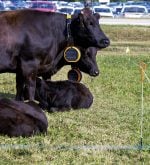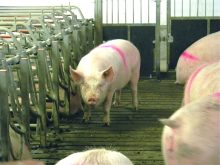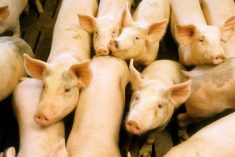The arrival of African swine fever (ASF) in the Caribbean is fuelling concern that the virus could move onto the North American mainland.
The USDA’s Animal and Plant Health Inspection Service (APHIS) confirmed that the deadly hog virus was found in samples from pigs in the Dominican Republic on July 28 as a result of a cooperative surveillance program. The USDA said in a statement that it received positive tests from two farms in two separate provinces. As of mid-August, the virus had been detected in 11 of the Dominican’s 32 provinces.
Why it matters: African swine fever poses a significant economic risk to Canada’s pork industry.
Read Also

Defence investments could benefit agriculture
A bump in Canada’s NATO spending commitments could lead to infrastructure investments that would benefit rural areas
According to the National Pork Producers Council in the U.S. this is the first detection of ASF in the Americas in nearly 40 years.
“An outbreak of ASF in Canada could devastate the Canadian pig herd, placing farm families and tens of thousands of jobs along the entire value chain at risk,” the Canadian Pork Council (CPC) said in a release. “A single, positive case could result in the immediate suspension of pork and pig exports valued at over $5 billion in 2020.”
In response to the positive test, the Canada Border Services Agency (CBSA) immediately added the Dominican Republic to the list of countries that border officers are screening for ASF risks. Since 2019, the agency has increased the number of detector dog teams and upped its public awareness efforts to warn air travellers not to bring pork products into Canada. It has also enhanced its control measures for imports of unprocessed grain and oilseeds from ASF- infected countries.
CPC Chair Rick Bergmann said in the release that this quick response by the CBSA is the outcome of collaborative work by Canadian pork producers and senior government officials “to strengthen Canada’s capacity to prevent and, if necessary, respond to an ASF outbreak.”
Following the recent Federal-Provincial-Territorial Ministers Meeting, Agriculture and Agri-Food Minister Marie-Claude Bibeau said ASF preparedness and response is a major priority for the federal government. “We recommitted with Ministers to make African swine fever preparedness and response planning a priority, identifying gaps and determining next steps,” she said after the July 15 meeting.
Bergmann noted that while much progress has been made, “there remain opportunities to eradicate wild pigs, enhance biosecurity and develop the response policies and programs that will be needed should there ever be a Canadian outbreak.”
Gary Stordy, CPC’s director of government and corporate affairs told Farmtario that planning discussions have always had good participation amongst senior officials and industry, but the recent finding has “kick-started” more regular conversations amongst industry and senior officials in Canada and the U.S.
“Very targeted high-level conversations are happening.”
He said although there have been good efforts from participants all along, there is a need to expedite efforts in some areas, particularly for enhancing biosecurity and financial recovery options for producers.
“Existing programs are not going to be sufficient to manage the [financial] situation if ASF is detected here,” he said.
Stordy said that although CBSA efforts do work, they could be increased. People travelling to and from any country that has had a positive ASF case presents a concern.
“What is needed is more education, signage, to really inform visitors and returning travellers that meat should not be brought back in luggage,” he said. “That component is incredibly important.”
Detector dogs are another visual reminder, and an active way to search for items, he said, but he questions whether are enough for the number of flights. “The Caribbean is a very popular tourist destination.”
Stordy added that biosecurity in the industry will also be key to mitigating entry or spread of ASF, “but we are only as strong as our weakest link.” He said the pork industry is currently working hard to ramp up biosecurity education efforts. Some vulnerabilities exist, particularly with backyard herds or those who raise a few pigs for their own use.
Stordy said biosecurity education will be further enhanced when the construction of the new Ontario Swine Research Centre at the University of Guelph is completed, as training on biosecurity will not just focus on larger producers, but it will be available to producers with any number of pigs.















